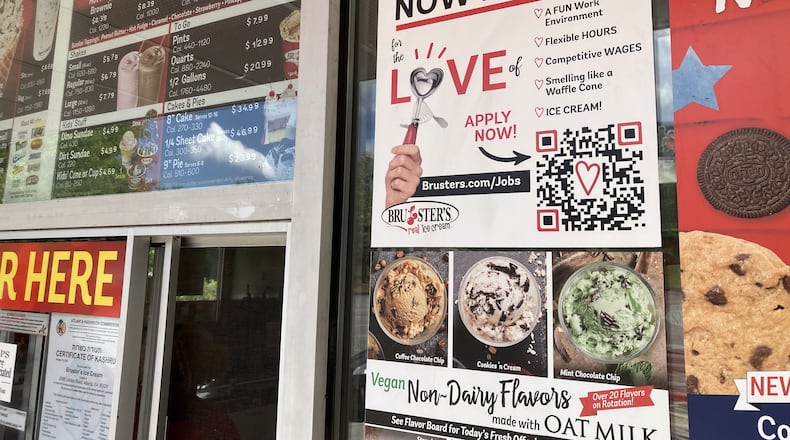The Georgia economy last month grew decently last month, but the expansion was uneven as businesses and consumers alike fight higher interest rates and the lingering impact of the past two years of inflation, the state Department of Labor said Thursday.
The state added 8,900 jobs in June, with the strongest growth in health care, logistics and state government.
“The June numbers are pretty good, but my concern is that it’s concentrated in just a few areas,” said Mark Vitner, chief economist for Piedmont Crescent Capital, a consultancy that helps businesses and governments. “We see weakness in the parts of the economy where people have to borrow to spend. When the Federal Reserve raises interest rates, it’s tougher for people to buy houses and cars.”
The long expansion has become uneven, he said.
The dramatic slowdown in home sales has hurt businesses dependent on housing, while for its own reasons, the Georgia film industry has been struggling, Vitner said.
“Hospitality, health care and government account for only 39% of the employment base, but they account for 69% of the jobs added last month,” he said.
Moreover, the pace of job growth in Georgia has slowed. In the past 12 months, the state has added 64,200 jobs — an expansion of 1.3%. In the previous 12 months, 106,500 jobs were added — an expansion of 2.2%. And in the 12 months prior to that, 228,100 jobs were added — which was an expansion at a robust 5% clip.
Yet the U.S. and Georgia economies have stubbornly avoided the recession predicted a year ago by many experts.
Georgia’s unemployment rate last month ticked up to 3.3%, up from 3.2% in May.
Bruce Thompson, the state’s labor commissioner, chalked up the slight increase to an influx of new graduates. The number of people in the labor force grew 15,502 in June, he said, up 48,000 in the past three months and 81,242 over the past 12 months.
Some of those new jobseekers have not found work, Thompson said. “This may temporarily increase seasonal unemployment.”
The jobless rate is still historically low. Except for one month in 2020, the Georgia unemployment rate has been lower than the national average since late 2018.
The Federal Reserve Bank of Atlanta, which regularly issues forecasts, on Wednesday said the economy seems to be growing at a solid 2.7% pace, which is consistent with good job growth. That is also slightly better than most independent economists predict.
In a separate report, known as the Beige Book, the Atlanta Fed said in a statement that hiring has slowed overall, but “worker shortages persisted in certain industries including construction, maintenance, retail, nursing, and tourism.”
Yet interests rates remain high and fears continue of a stall-out.
Interest rates, which affect costs of credit card debt, auto loans, home equity loans and mortgages — as well as business loans — are generally pegged to the benchmark set by the Federal Reserve.
The Fed dramatically lifted that rate in 2022 and 2023 in an aggressive campaign to chill inflation. With the inflation rate down, the Fed has lately been giving signs that a rate cut is coming, perhaps in September.
The key to the economy’s direction is the American consumer, who accounts for more than two-thirds of all spending. And reports from the consumption front continue to show healthy spending — along with an undercurrent of worry about household finances.
The most recent snapshot was Tuesday’s “Prime Day” promotion from Amazon, in which consumers spent about $7.2 billion, according to Adobe Analytics, which analyzes online data.
That was 11.7% higher than a year ago, Adobe reported.
But a rising share of buyers were using a “buy now, pay later” option that accounted for 7.5% of online orders, Adobe said, up a substantial 17.1% from last year, Adobe said in a statement. “Consumers continue to embrace more flexible ways to manage their budgets.”
Fourth of July travel also shattered records, another sign of continued consumer spending.
Credit: John Spink
Credit: John Spink
Consumers typically don’t cut spending until they feel they have to, said Glenn Williams, chief executive of Primerica, a Duluth-based provider of financial, insurance and investment services to middle-income households.
“At first, people don’t change their behavior,” he said. “They change how they pay for it.”
That means making less of a contribution to savings and making more use of credit cards, Williams said.
The company surveys thousands of customers to ask about their financial status. And while incomes are generally higher and inflation has fallen dramatically — to about 3% annually — a lot of households fell behind two years ago when prices were rising much more rapidly, he said.
And with the rates on credit cards climbing, consumers who are holding more debt are paying more in interest.
“I can tell you that families are stressed,” Williams said. “The hole that we were digging needs time to be filled in.”
A story of deceleration
Georgia jobs, cumulative total added the previous 12 months
June 2021: up 270,300
June 2022: up 228,100
June 2023: up 106,500
June 2024: up 64,200
Georgia jobs added by month
March 2024: 18,600
April 2024: 12,600
May 2024: 9,200
June 2024: 8,900
Georgia unemployment rate
April 2024: 3.1%
May 2024: 3.2%
June 2024: 3.3%
Sources: Georgia Department of Labor, Bureau of Labor Statistics, Investopedia, Federal Reserve
_________________________________________
About the Author
Keep Reading
The Latest
Featured




